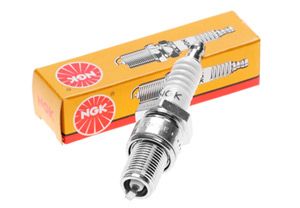Cars equipped with gas installations face harsher working conditions compared to gasoline engines. In particular, the propane-butane mixture has a significant impact on the ignition system. The highest frequency of ignition issues is observed during winter, due to the difficulty of igniting the gas-air mixture in low temperatures. However, it's crucial to properly maintain components like spark plugs throughout the year to avoid engine start-up problems.
Several factors influence this, but the most important one is the nature of the propane-butane mixture. Specifically, it has a higher combustion temperature than gasoline. Due to this higher combustion temperature and slower burning process, specialists recommend more frequent replacement of spark plugs in vehicles with LPG systems, suggesting they be replaced twice as often as in gasoline engines. Spark plug manufacturers, recognizing the growing popularity of LPG-powered vehicles, have introduced special spark plugs with optimized longevity and parameters tailored to the challenging conditions of a gas-air mixture.
In today’s article, we’ll explain whether buying these spark plugs is economically viable, how they affect engine performance, and whether their installation is necessary.
Spark Plugs for Gas Engines

Opinions on spark plugs for gas-powered vehicles are divided. Many workshops prefer to stick with spark plugs recommended by car manufacturers, considering LPG-specific plugs as merely a marketing ploy.
However, an increasing number of mechanics appreciate these plugs for their lower electrical resistance, which makes ignition faster and easier. This advantage stems from the materials used in LPG spark plugs. Renowned manufacturers use materials like platinum or iridium, which have high melting points, enabling the use of thinner electrodes compared to standard plugs.
Characteristics and Requirements for LPG Spark Plugs
Spark plugs for LPG-powered engines must meet specific requirements to ensure proper engine operation. One of the key factors is the higher combustion temperature of the LPG fuel-air mixture, which demands greater ignition energy. Consequently, LPG spark plugs should have lower electrical resistance to facilitate easier spark generation. Additionally, the materials used in their construction should be more resistant to corrosion and erosion caused by high temperatures. This enhances their durability and ensures more efficient engine performance.
LPG-specific spark plugs differ from standard ones in their lower electrical resistance and better resistance to high temperatures and corrosion. Using materials like iridium or platinum allows for thinner electrodes, which facilitate quicker spark generation. This design improves ignition efficiency and reduces plug wear in demanding conditions.
Choosing the Right Spark Plugs for LPG
Choosing the right spark plugs for LPG is crucial for proper engine performance. Spark plugs for LPG should be selected according to the car manufacturer's recommendations and have the appropriate heat rating. Platinum plugs are often recommended for LPG engines due to their higher resistance to corrosion and erosion. Additionally, it’s worth considering spark plugs from reputable manufacturers like Bosch and NGK, known for the high quality of their products, which translates to better performance and longer service life.
Spark Plugs for LPG - Price
Price is a key criterion when choosing spark plugs. For LPG-specific plugs, the cost is noticeably higher compared to traditional models recommended by manufacturers. Regularly replacing worn-out spark plugs is also essential to maintain engine efficiency and avoid issues like engine stalling or increased fuel consumption. If price is not a limiting factor, we recommend choosing products from trusted manufacturers. Among the most popular are NGK and Bosch.
Although LPG-specific spark plugs are more expensive, their longer lifespan and positive impact on engine performance can offset the higher initial cost in the long run. Moreover, they can reduce the risk of ignition system damage caused by incompatible plugs.
Investing in high-quality LPG spark plugs can result in better efficiency and engine reliability.
Replacement and Maintenance of Spark Plugs
Replacing and maintaining spark plugs for LPG engines is key to ensuring proper engine operation. LPG spark plugs should be replaced according to the recommendations of the car or spark plug manufacturer, typically every 20,000-30,000 kilometers for standard plugs. For iridium or platinum plugs, their lifespan may be significantly longer. Regular checks of the spark plugs’ condition and ignition wires are necessary to avoid problems with igniting the gas-air mixture. It’s also worth considering special ignition wire lines designed for LPG engines, as they are more resistant to high temperatures and corrosion. Regular maintenance and replacement of these components ensure long and trouble-free engine operation.
Ignition Wires
Special ignition wire lines have also been developed for gas-powered cars. However, there is also a theory that this is just a marketing gimmick aimed at extracting more money from LPG car owners. In reality, properly chosen ignition wires for vehicles with gas installations can significantly impact engine efficiency and longevity, and they require regular maintenance to avoid operational problems.
While opinions vary, it’s clear that higher-end ignition wires designed for gas installations often feature cores that better withstand the unique demands of LPG systems. The most common types include:
-
carbon-core wires,
-
copper-core wires,
-
ferrite-core wires.
Ferrite-core (ferromagnetic) wires are considered the best due to minimal voltage drops, enabling ignition even in unfavorable weather conditions. The insulation is also critical and should be made from materials resistant to weather, oils, and greases.
How Often to Replace Ignition Wires?
Ignition wires, often overlooked, are also consumable items that require care. Periodically checking for exposure to oils or greases, which can reduce their lifespan, is essential. Ensuring they are not damp can also significantly extend their service life. Following manufacturers' recommendations is crucial, as they often provide varying guidelines. For gasoline-powered vehicles, ignition wires are typically replaced after 50,000-80,000 kilometers. For LPG-powered cars, this should be done sooner. Regular replacement of spark plugs is also recommended to keep the engine in good condition and maintain its efficiency.
